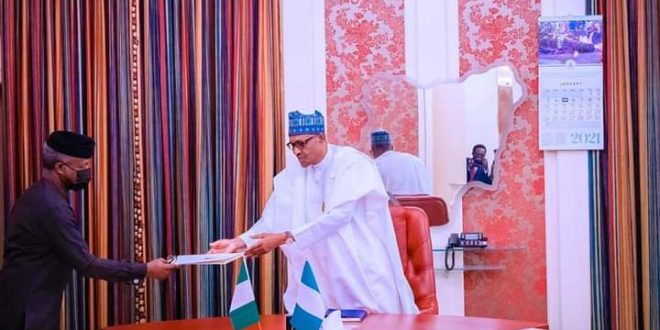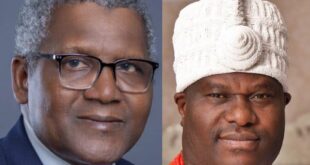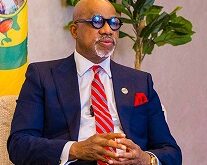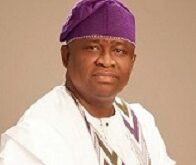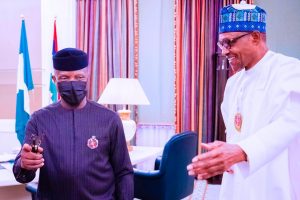 ABUJA – In their first official meeting for the year 2021, President Muhammadu Buhari on Tuesday, January 5, 2020, received Prof. Yemi Osinbajo (SAN) in his office where the Vice President updated him on the progress recorded so far in the implementation of the Economic Sustainability Plan (ESP).
ABUJA – In their first official meeting for the year 2021, President Muhammadu Buhari on Tuesday, January 5, 2020, received Prof. Yemi Osinbajo (SAN) in his office where the Vice President updated him on the progress recorded so far in the implementation of the Economic Sustainability Plan (ESP).
According to a release e-signed and made available to StarTrend Int’l & online – www.startrendinternational.com by Laolu AkandeSenior Special Assistant to the President on Media & Publicity, Office of the Vice President, Buhari had mandated Vice President Osinbajo as chair of the Economic Sustainability Committee, to coordinate the implementation of the ESP aimed at cushioning the economic effects of the COVID-19 pandemic.
About three months into the implementation of different components of the plan namely, MSMEs Survival Fund; Social Housing Scheme, and Solar Home System, among others, Nigerians across different sectors have been impacted.
For the Payroll Support track of the Survival Fund, a total of 277,628 beneficiaries drawn from 56,575 businesses have now been paid.
This total number includes the batch of 20,614 beneficiaries that were recently been paid for October, and 257,014 beneficiaries that were paid for November and December.
A breakdown of the 257,014 beneficiaries shows that: N30, 000 each was paid to 222,466 beneficiaries as November and December payments while N50,000 each was paid to 34,548 beneficiaries as November and December salaries.
Out of the total number, 3 per cent are beneficiaries with special needs, while 43 per cent are female employees/beneficiaries.
Meanwhile, the enumeration of prospective beneficiaries for the Transport Support Track, which was launched in December 2020, is still ongoing. And payment of N30, 000 one-time grant to 333,000 artisans across the country is in progress with payments already made to verified beneficiaries in States under streams 1, 2, and 3, comprising FCT, Lagos, Ondo, Kaduna, Borno, Kano, Bauchi, Anambra, Abia, Plateau and Delta (under stream 1); Taraba, Adamawa, Bayelsa, Edo, Ogun, Ekiti, Katsina, Kebbi, Kogi, Kwara, Enugu, and Ebonyi (under stream 2); Akwa-Ibom, Cross River, Zamfara, Yobe, Sokoto, Nasarawa, Niger, Imo, Oyo, Osun, Jigawa, Gombe and Benue (under stream 3).
The process of installation of the N140 billion Solar Home System that will cover up to 5 million households, serving about 25 million individuals in rural areas and urban communities, has begun with the enlistment of solar assembling companies and components manufacturers as well as solar servicing firms.
Under the scheme, the Central Bank of Nigeria (CBN) will make available funds to private companies involved in the manufacture, installation, servicing of the solar systems, at rates ranging between 5 to 10 percent.
An important aspect of the scheme is the option of outright ownership by beneficiaries at a cost ranging from N1, 500 per week to N4, 000 monthly depending on the capacities, for a period of 3 years.
The plan by the Federal Government support 1.5 million Nigerians to acquire low-cost houses Under the Social Housing program of the ESP is on course as the portal for application by prospective beneficiaries was launched in December 2020 alongside the prototype 1-bedroom and 2-bedroom units.
During a visit over the weekend to the completed model houses in Dei Dei at the Federal Capital Territory, Vice President Yemi Osinbajo, SAN, reiterated the FG’s commitment to deliver decent and affordable accommodation that will be within the reach of many Nigerians.
The plan is to have a Rent to Own option as part of the Buhari administration’s resolve to impact the common man in the social housing scheme expected to also generate 1.8m jobs and deliver houses to about 1.5m Nigerian families.
Already sites for early start projects have been identified in all the 6 geo-political zones in addition to the FCT.
The sites include those in Ekiti and Ogun in the Southwest, Enugu, and Abia in the Southeast, Delta, and Edo in the South-south, Yobe, and Bauchi in the Northeast, Kaduna and Katsina in the Northwest and Nasarawa and Plateau in the North-central. Sites have also been identified in Abuja.
To kickstart the social Housing projects, the CBN has already committed to a N200B facility with a guarantee by the FG via the Finance Ministry.
The implementing agency, Family Homes Fund Ltd, an agency under the Federal Ministry of Finance has already mobilized thousands of Cooperatives groups across the country who will participate in the social Housing plan as the main warehouse agents and mobilize low-income buyers. For instance, FHF met recently with 93 Cooperative Leaders from the 6 geographical zones, under the aegis of the Co-Operatives Federation of Nigeria.
In another development, during a virtual meeting on Tuesday with management of the North East Humanitarian and Innovation Hub (NEHIH), Prof. Osinbajo pledged the support of the Federal Government and the National Economic Council (NEC) in the establishment of a Social Innovation and Research Institute (SIRI), an initiative of NEHIH aimed at developing skills and building capacity for social innovation.
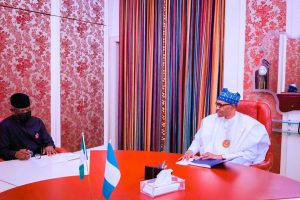 The Vice President noted that idea of establishing a centre for social innovation as conceived by the NEHIH was good, emphasizing that “I don’t think there is enough attention being paid to the local needs of social innovation. I really think that this proposed institute can do enough in terms of capacity building and leveraging on ideas. And also making a lot of the innovations relevant to our demands and needs here in Nigeria.”
The Vice President noted that idea of establishing a centre for social innovation as conceived by the NEHIH was good, emphasizing that “I don’t think there is enough attention being paid to the local needs of social innovation. I really think that this proposed institute can do enough in terms of capacity building and leveraging on ideas. And also making a lot of the innovations relevant to our demands and needs here in Nigeria.”
Prof. Osinbajo added that “part of the work I think SIRI might end up doing is in looking at our peculiar humanitarian condition, because the humanitarian condition that we find ourselves in Nigeria is enormous, a huge one.
“So, there is an opportunity here to teach the rest of the world how to deal with this, especially from the point of view of education of children in conflict situations, and even entrepreneurship in conflict situation.”
Other participants at the meeting include the coordinator of the Hub, Mr Ahmad Moddibo, the SIRI project coordinator at the hub, Nguveren Mary, among others.
 Startrend International Magazine For Your Latest News And Entertainment Gists
Startrend International Magazine For Your Latest News And Entertainment Gists


